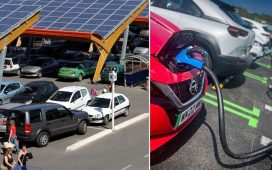In Washington this week, Republicans in the US House of Representatives unveiled sweeping tax reform proposals that target cornerstone federal support mechanisms for electric mobility. Chief among them is the planned repeal of the $7,500 federal tax credit for new electric vehicles and the $4,000 incentive for used EVs. Both would expire on 31 December 2025 under the plan, although manufacturers who have yet to surpass the 200,000-unit sales cap would retain eligibility for one additional year.
According to Bloomberg, President Donald Trump needs the funds to finance his other tax cuts. The US Treasury Department is said to have granted a good 2 billion dollars in sales rebates for electric cars in 2024. As reported, the list of eligible vehicles already shrunk significantly by 1 January 2025. For Trump, however, the cancellation is also a matter of principle: the president himself had already derided the EV tax credits in the past as part of a ‘new green scam’, among other things. In preparation for his second term in office, it was already leaked that scrapping the EV subsidy was one of Trump’s priorities.
The measure is set for review by the influential House Ways and Means Committee this week, and it has already drawn fierce criticism from across the electrification landscape. As per Reuters, Genevieve Cullen, President of the Electric Drive Transportation Association, condemned the proposal as ‘catastrophically short-sighted,’ arguing that gutting federal investment in EVs would amount to ceding US leadership in automotive innovation to strategic competitors like China.
While the proposed legislation preserves the battery production tax credit—vital for OEMs and cell suppliers—it introduces a protectionist clause that would disqualify EVs using battery components made by certain Chinese companies or under Chinese licence agreements starting in 2027. This could directly affect EVs from Ford and Tesla, both of which have partnerships with Chinese battery tech firms.
Perhaps more significantly for the supply side, Republicans are seeking to eliminate the Department of Energy’s Advanced Technology Vehicles Manufacturing Loan Program. This fund has been instrumental in scaling up US EV production capacity. Under the Biden administration, more than $23 billion in loans have been allocated to major projects: $9.63 billion to BlueOval SK (a Ford–SK On JV), $7.54 billion to Stellantis–Samsung SDI, and $6.57 billion to Rivian – all earmarked for new gigafactories across the Midwest and Southeast.
Should the proposal become law, it would leave state-level incentives and corporate strategy to shoulder the burden of EV momentum. But more worryingly, it could undermine investor confidence in the US as a long-term hub for EV innovation and production, just as China and the EU press ahead with coordinated electrification strategies.
reuters.com, bloomberg.com, docs.house.gov (PDF; from page 216)








